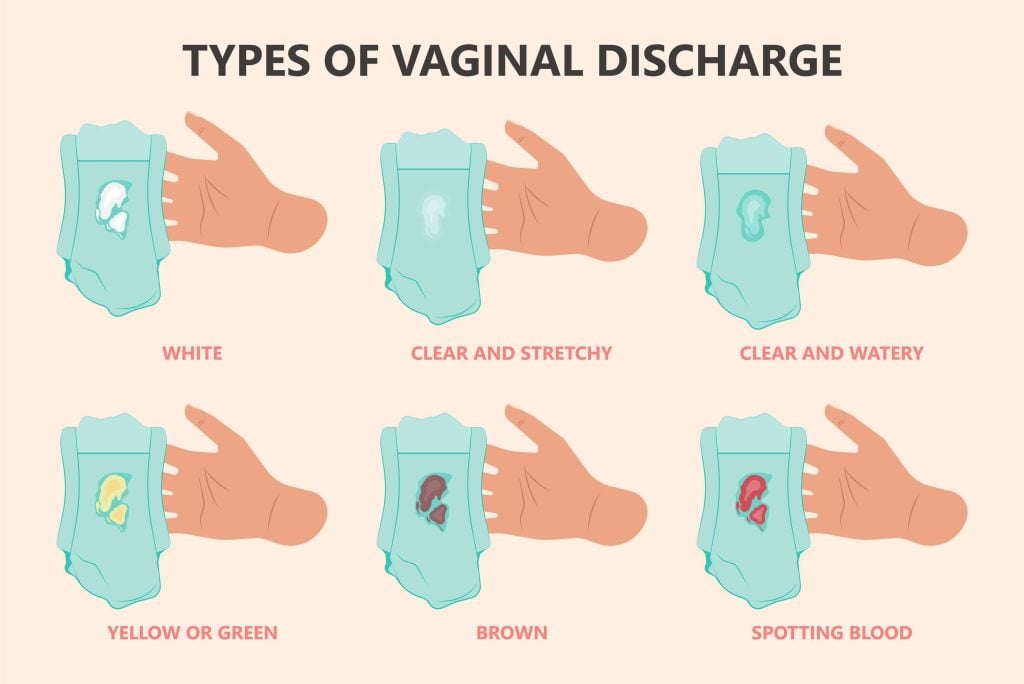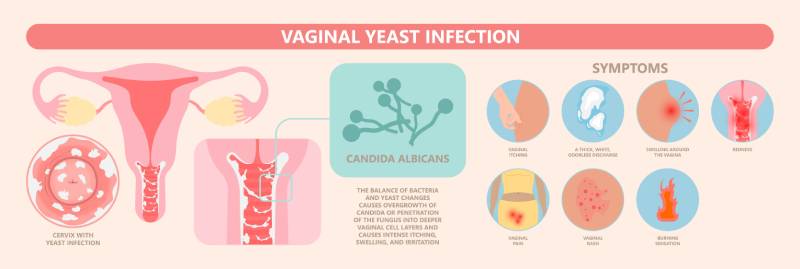Pregnancy can be a time of heightened anxiety as well as happy anticipation. It’s understandable that some of the changes that pregnancy causes are themselves cause for concern. However it’s perfectly normal for women to experience increased vaginal discharge during pregnancy.
In this IVI blog article, we take a look at its different types. Which of them are normal and on the other hand, which kinds of discharge could be a sign of a health issue or problem? We’ll guide you through a timeline too, to set out what you might expect from early pregnancy discharge, the changes you may see as the pregnancy progresses, and the sort of discharge that is more likely to occur in the final weeks of your baby’s journey towards birth.
Why discharge increases during pregnancy?
During pregnancy, vaginal discharge increases because it helps prevent infections from traveling from the vagina to the uterus. In other words, it acts as a protective barrier.
Toward the end of pregnancy, the amount of discharge may rise even more, and during the last week it can contain pink-tinged mucus with a more gelatinous texture. This is the mucus plug, which is released as the body begins preparing for labor. Many women notice this in the days leading up to childbirth.
Is it normal to have vaginal discharge in pregnancy?
Women between the ages of puberty and menopause have some level of vaginal discharge throughout these years. Levels and type of discharge, dictated by changes in hormone levels, fluctuate throughout the monthly menstrual cycle. It’s the same during pregnancy but usually even more so. When you are pregnant, some degree of vaginal discharge, more than in your non-pregnant state, is normal and entirely healthy. This increased level of discharge helps to protect your uterus, and the developing foetus inside it, from infections travelling up the vaginal canal.
Normal discharge is generally clear or milky white, thin and odourless or mild-smelling. If you find that the amount has increased over normal levels, this is nothing to worry about. It can be easier to cope if you wear unscented cotton panty liners. The reason for it is that higher levels of oestrogen circulating in your bloodstream when you are pregnant cause elevated blood flow around the pelvic area. This stimulates the body’s mucous membranes to produce a discharge. This discharge contains dead cells which are removed and protects the birth canal from infection. Its function is also to maintain a healthy bacterial balance.
What kind of discharge may be a sign of a problem?
Generally speaking, any kind of discharge which is not clear or milky white and smells unpleasant could be a sign of one of a number of problems. Most of them are not serious and treatments are easy. These could include white and lumpy, rather than smooth, discharge. This could be a sign of a yeast infection such as thrush. Your body is more susceptible to it to during pregnancy. Other signs of a yeast infection can include painful urination and an itchy or burning sensation.
A red discharge, i.e. bleeding, may not be a problem if it is very light during early pregnancy. However, your midwife or medical advisor should investigate any bleeding after the first trimester.
Is it normal to have brown discharge while pregnant?
Brown discharge is normally old blood leaving the body and is not usually a cause for concern.
Yellow discharge during pregnancy: is it normal?
A green or yellow discharge which smells unpleasant could be a sign of an infection caused by an STD such as chlamydia. It’s important to consult your doctor in this case because untreated STDs can cause pregnancy complications. They are usually easily treated.

How discharge changes throughout pregnancy — by trimester / stage ?
During pregnancy, it is common to experience changes in vaginal discharge due to hormonal fluctuations, as we will explain below. However, any sudden change in the color, odor, or texture of the discharge should be discussed with a healthcare professional to rule out potential infections or complications.
First trimester (early pregnancy)
Many women notice an increase in the normal clear or white discharge during early pregnancy. Some, though not all, also have some slight spotting or very light bleeding that could be a sign of implantation. This is when the fertilized egg has completed its journey from the fallopian tube to the uterus and burrows into the endometrium, the lining of the uterus. This is implantation, and normally occurs within two weeks of conception.
When the embryo burrows into the womb lining, it can damage tiny blood vessels, resulting in the spotting or ‘implantation bleed’. This can be accompanied by slight cramps and is nothing to worry about. For some women, the implantation bleed, which can easily be confused with an early start of your next period, is one of the first signs that they may be pregnant. You can learn more about this in our blog article on the differences between menstruation and implantation bleeding.
Mid-pregnancy
Vaginal discharge gradually increases during the course of your pregnancy, being heaviest towards the end. The only time you would need to be concerned is if the discharge were to change color or if you felt any discomfort such as itching or burning. If this happened, it would be sensible to consult your doctor.
If your discharge turns into leaking or even gushing water which is pinkish or clear before 37 weeks, it may be a sign that your waters have broken early. This could result in a risk of infection for both you and your baby. It could also lead to a pre-term birth. If this happens, you should seek help from your midwife or doctor immediately.
Late pregnancy / near labour
As your pregnancy reaches its final stages, your body starts to prepare for the birth. You could notice during the last week or two that the discharge has streaks of jelly-like, streaky pink mucus. This is called a ‘show’ and is a signal that the mucus plug, which has been blocking your cervix throughout the pregnancy, is starting to fall away. It’s quite possible to have a few small ‘shows’ during the few days before labour begins.
At some point your waters will break. If your vaginal discharge turns into leaking or regularly flowing water after 37 weeks, you could be about to go into labour. In that case you should call your midwife or maternity doctor immediately. You may not need to go into hospital straight away. However, your medical team need to record the time that your waters broke and advise you on what to do next.
When discharge may be cause for concern
To understand whether your vaginal discharge is normal or not, pay attention to the following signs:
-
Itching
-
Pain or tenderness
-
A lumpy or cottage-cheese–like texture
-
Bleeding between periods or after menopause
-
Recurrent bleeding after sexual intercourse
-
Gray, green, or yellow discharge
-
A strong or unpleasant odor
-
Burning during urination
If you experience any of these symptoms, you should consult a healthcare professional. The necessary tests typically include a pelvic exam and laboratory analysis of a discharge sample.
Common causes of problematic discharge
The most common causes behind changes in the texture, smell, or color of vaginal discharge are infections. Below are some of the most frequent ones.
Yeast infection
This is a fungal infection, usually caused by Candida. Vaginal candidiasis develops when there is an imbalance in the natural yeast found in the vagina. One of the main symptoms is thick, white discharge.

Bacterial vaginosis
This condition results from an overgrowth of bacteria that normally live in the vagina. Discharge may appear grayish, yellow, or greenish and is often accompanied by a strong odor.
Chlamydia
This sexually transmitted infection (STI) is caused by the bacterium Chlamydia trachomatis.
Gonorrhea
This common STI can cause yellowish discharge, although it frequently presents without symptoms.
Vaginal discharge during pregnancy: common questions
Below we answer some of the most frequent questions about vaginal discharge.
Is it normal to have yellow discharge when pregnant?
No, yellow discharge is not normal during pregnancy. It is common to experience an increase in vaginal discharge, but its color is usually clear or whitish, with no strong smell. Yellow discharge may be a sign of infection, which is why it’s important to contact a specialist immediately.
What does abnormal discharge look like during pregnancy?
Abnormal discharge during pregnancy may appear greenish, yellowish, grey, or brownish. A strong, fishy smell is also considered abnormal, as well as the presence of itching, burning, pain, or bleeding.
Can increased discharge be an early sign of pregnancy?
Yes, increased discharge may be an early sign of pregnancy. Hormonal changes can cause a light, clear, or milky-white discharge, although this is not a definitive sign of pregnancy. It may also be related to other causes.
At IVI, we can help you become a mother
To conclude, when you are pregnant, vaginal discharge is normal and helps to protect you and your baby from infection. You should seek medical advice immediately if your discharge changes color, has an unpleasant odour, or you have itching, burning or pain. Your doctor should investigate any bleeding, apart from light spotting very early on.
At IVI we can help you with any unusual symptom during your early pregnancy and of course, if you have infertility issues. You can contact us through our online contact form, we’ll help you make your dream real.
Bibliography
https://www.nhs.uk/pregnancy/common-symptoms/vaginal-discharge/





Comments are closed here.